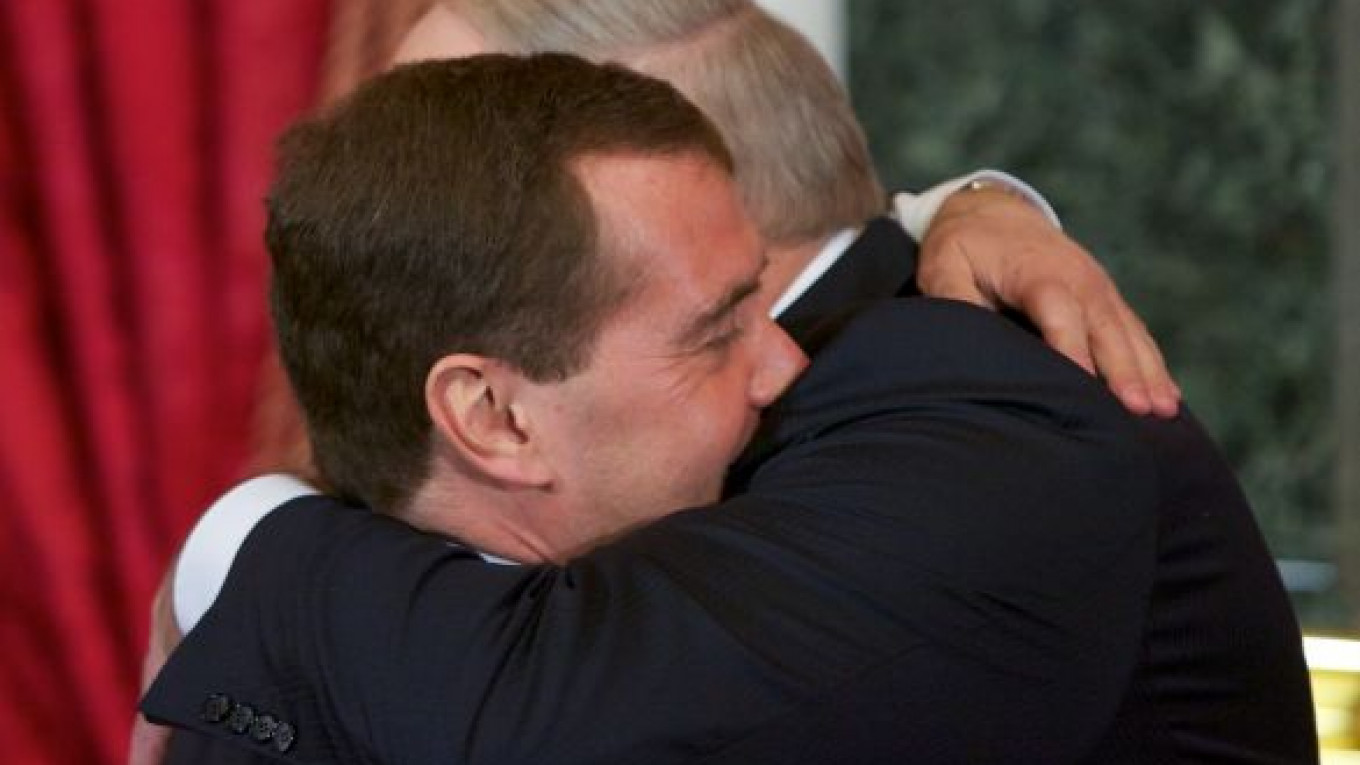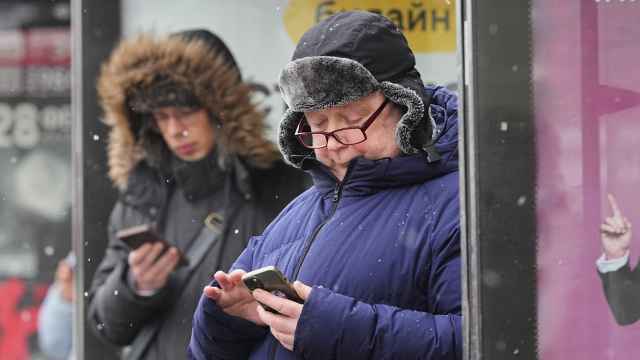The Kremlin on Monday hosted controversial Belarussian leader Alexander Lukashenko for talks about deeper economic integration amid growing calls for tougher sanctions against Belarus for the execution of two convicted bombers.
Lukashenko took part in a summit of the Eurasian Economic Community, which Prime Minister and President-elect Vladimir Putin wants to develop into a union of former Soviet states that would rival the European Union.
Belarussian Deputy Prime Minister Sergei Rumas said after the talks that participants had agreed on working out concrete steps to counter any sanctions. "All sides agree that no group of states should put pressure on any member state," Rumas was quoted as saying by Interfax.
EU officials talked of introducing broader economic sanctions against Minsk because of the executions of Vladislav Kovalyov and Dmitry Konovalov, who were convicted of carrying out a bomb attack in the Minsk metro that killed 15 people and wounded more than 300 in April 2010.
Belarussian state television said over the weekend that the two had been executed, prompting horror and outrage in the West.
Germany's Frankfurter Rundschau newspaper called Lukashenko a "merciless barbarian" in an editorial published Monday.
Human rights activists that the trial against the two had raised suspicion about their guilt. The doubts were fueled by a Belarussian High Court decision in January ordering the destruction of all material evidence against them.
Critics also said the seemingly hurried execution could be part of an official cover-up.
"An opinion has also been expressed that the death sentence was executed so fast because the two men knew something about the real organizers of the terrorist attack," Estonian lawmaker Andres Herkel on his website.
Jacek Protasiewicz, a Polish member of the European Parliament, said the 27-country union would probably slap new sanctions against Minsk and withdraw its ambassadors permanently from Belarus, leaving its diplomatic relations at consular level.
"Lukashenko's tragic, shocking and incomprehensible decision showed that he is not interested in cooperation with the West," Protasiewicz told Polish radio station RMF FM, the Naviny.by website .
Last month, the EU recalled its ambassadors from Belarus after Minsk kicked out the Polish and EU envoys in retaliation for Brussels' decision to ostracize more Belarussian officials.
Dubbed "Europe's last dictator," Lukashenko has seen his ties with the West worsen dramatically since his December 2010 re-election.
He launched a violent crackdown on opposition activists who complained about vote-rigging.
Brussels has so far focused on sanctions against individual officials but is facing louder demands for extending the penalties further.
Dmitry Uss, who ran against Lukashenko in the election and was arrested along with most other candidates after the vote, called for tougher European sanctions.
"I beg you to show wisdom, toughness and decisiveness and impose economic sanctions against Belarus in order to save the country from further decline," he wrote in an open letter to EU foreign policy chief Catherine Ashton, the Belapan news agency .
The European Parliament said in a resolution last week that the EU should impose broad economic sanctions.
Kommersant reported Monday that possible targets could be key companies like the Belneftekhim petrochemical conglomerate and major banks.
The EU Council of Ministers will discuss a list of enterprises and businessmen by late March, the paper reported, citing no sources.
Europe is Belarus' major trade partner after Russia, and the country sells large quantities of potash, petroleum products and oil to several EU members.
Moscow has already signaled that it would not approve of sanctions against Minsk.
"We won't allow any harm to our Belarussian colleagues," deputy Prime Minister Dmitry Rogozin last week.
Most experts agreed Monday that both Lukashenko and Moscow will continue to ignore Western public opinion.
"It can't get much worse than it is right now," Belarussian analyst and opposition politician Yaroslav Romanchuk said.
He said outrage about the death sentence is not shared by most people in Belarus and that the backlash could actually boost Lukashenko's popularity.
"He will just say that he is not bowing to outside interference," Romanchuk said.
He added that economic sanctions would likely miss their mark because Minsk could easily circumvent them by redirecting exports through Russia.
Konstantin Zatulin, a former United Russia State Duma deputy who heads the influential Commonwealth of Independent States Institute think tank, said Moscow would not and should not change tack.
"Russia and Belarus have lived over hundreds of years together through wars and revolutions. We won't change relations just because of an execution," he said.
Zatulin scoffed at Western criticism of Belarus, which he said is too narrow because it considers only the death penalty and economic difficulties, both of which can be found elsewhere.
"What about the death penalty in the United States?" he asked, adding that Belarus' financial troubles were less severe than those of Greece.
Others pointed out that the latest spat with Europe would only boost Russia's influence over its western neighbor.
"The more isolated Lukashenko is from the rest of the world, the more dependent he is on Moscow," political commentator Konstantin Eggert on Kommersant FM.
A Message from The Moscow Times:
Dear readers,
We are facing unprecedented challenges. Russia's Prosecutor General's Office has designated The Moscow Times as an "undesirable" organization, criminalizing our work and putting our staff at risk of prosecution. This follows our earlier unjust labeling as a "foreign agent."
These actions are direct attempts to silence independent journalism in Russia. The authorities claim our work "discredits the decisions of the Russian leadership." We see things differently: we strive to provide accurate, unbiased reporting on Russia.
We, the journalists of The Moscow Times, refuse to be silenced. But to continue our work, we need your help.
Your support, no matter how small, makes a world of difference. If you can, please support us monthly starting from just $2. It's quick to set up, and every contribution makes a significant impact.
By supporting The Moscow Times, you're defending open, independent journalism in the face of repression. Thank you for standing with us.
Remind me later.







